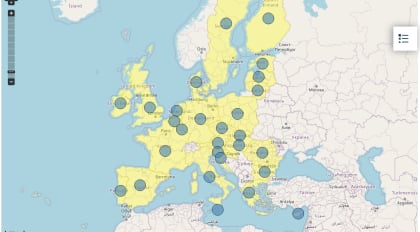
Data management

According to forecasts, the volume of data generated worldwide is set to exceed 180 zettabytes by 2025 and reach the impressive threshold of 2,000 zettabytes by 2035.
The environmental sector is no exception to this explosion, fuelled by the development of intelligent sensors, satellite technologies and artificial intelligence. This data, from both public and private sources, is essential if we are to better understand and anticipate our future needs. However, this digital revolution comes at an environmental cost.
Since its creation, OiEau, a recognised non-profit organisation, has been committed to the sustainable management of environmental data. It has adopted a sustainable and efficient approach, enabling all stakeholders in the same territory, from local to cross-border, to access scientifically robust information, while minimising the ecological impact of digital technology.
In the digital age, managing and making the most of environmental data is essential to support environmental, economic and societal transitions. To meet this crucial challenge, OiEau's experts are developing robust and sustainable information systems. They take care to adopt shared interoperability principles, and to develop and host digital services that guarantee the accessibility, security and durability of data.
Three key principles govern the services and tools developed by OiEau's experts, for a wide variety of private and public customers and partners.
1. Building appropriate, interoperable information systems
Since the performance of information systems depends on an architecture designed to meet the challenges of data management, analysis and sharing, our experts take care to :
- Design infrastructures that are scalable, modular and secure, and tailored to users' needs.
- Ensuring interoperability with other systems to encourage cross-fertilisation and enhancement of data.
- Implement repositories and standards to guarantee data quality, traceability and longevity.
2. Developing innovative and accessible digital services
Digital services play a key role in democratising access to data and in supporting users. OiEau's experts are developing them to :
- Facilitate decision-making through appropriate visualisation and analysis tools (dashboards, collaborative platforms, interactive mapping).
- Optimise the user experience by proposing ergonomic interfaces that are accessible and adapted to different user profiles.
- Encourage digital sobriety by favouring optimised, lightweight and efficient developments to reduce the energy footprint.
3. Hosting data securely and sustainably
The data hosting services offered by OiEau meet stringent requirements in terms of security, accessibility and performance, while incorporating an ecological dimension.















